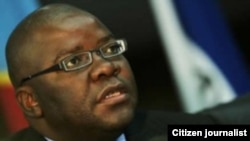WASHINGTON —
A serious crisis is looming in Harare as the government battles to secure US$95 million needed to fund the March 16 constitutional referendum.
The crisis has been worsened by the United Nations' refusal to fund the referendum citing time constraints.
The United Nations said it would have wanted to assess Harare’s needs first before committing resources. Several companies that the government had approached, including mobile phone operators and mining firms, told VOA that they too are struggling and cannot assist.
Finance Minister Tendai Biti says the government is still to secure funds needed to run the constitutional referendum while on the other hand Justice Minister Patrick Chinamasa maintains Harare has secured resources to support the national vote.
There was speculation that diamond revenues could have been availed to fund the referendum.
But Mines Minister Obert Mpofu told VOA that all government funds are channelled through Biti.
The Zimbabwe Electoral Commission’s deputy chairperson Joyce Kazembe said ZEC is waiting to hear from the justice ministry about the funds.
Meanwhile, students from tertiary institutions are devided over the draft constitution with some saying they will vote “No” in the referendum.
This came out at a meeting of representatives from five student groups at the University of Zimbabwe in Harare on Wednesday with COPAC representatives to discuss the draft charter.
Representatives from the National Movement of Catholic Students, Zimbabwe National Students Union (ZINASU), Female Students Network of Zimbabwe, Students Christian Movement of Zimbabwe and the Students Solidarity Trust first audited the draft constitution before inviting COPAC co-chairman Douglas Mwonzora to clarify areas of concern.
National Movement of Catholic Students coordinator Gift Mambipiri said most of them feel the draft takes away Zimbabweans’ the right to education.
The crisis has been worsened by the United Nations' refusal to fund the referendum citing time constraints.
The United Nations said it would have wanted to assess Harare’s needs first before committing resources. Several companies that the government had approached, including mobile phone operators and mining firms, told VOA that they too are struggling and cannot assist.
Finance Minister Tendai Biti says the government is still to secure funds needed to run the constitutional referendum while on the other hand Justice Minister Patrick Chinamasa maintains Harare has secured resources to support the national vote.
There was speculation that diamond revenues could have been availed to fund the referendum.
But Mines Minister Obert Mpofu told VOA that all government funds are channelled through Biti.
The Zimbabwe Electoral Commission’s deputy chairperson Joyce Kazembe said ZEC is waiting to hear from the justice ministry about the funds.
Meanwhile, students from tertiary institutions are devided over the draft constitution with some saying they will vote “No” in the referendum.
This came out at a meeting of representatives from five student groups at the University of Zimbabwe in Harare on Wednesday with COPAC representatives to discuss the draft charter.
Representatives from the National Movement of Catholic Students, Zimbabwe National Students Union (ZINASU), Female Students Network of Zimbabwe, Students Christian Movement of Zimbabwe and the Students Solidarity Trust first audited the draft constitution before inviting COPAC co-chairman Douglas Mwonzora to clarify areas of concern.
National Movement of Catholic Students coordinator Gift Mambipiri said most of them feel the draft takes away Zimbabweans’ the right to education.












